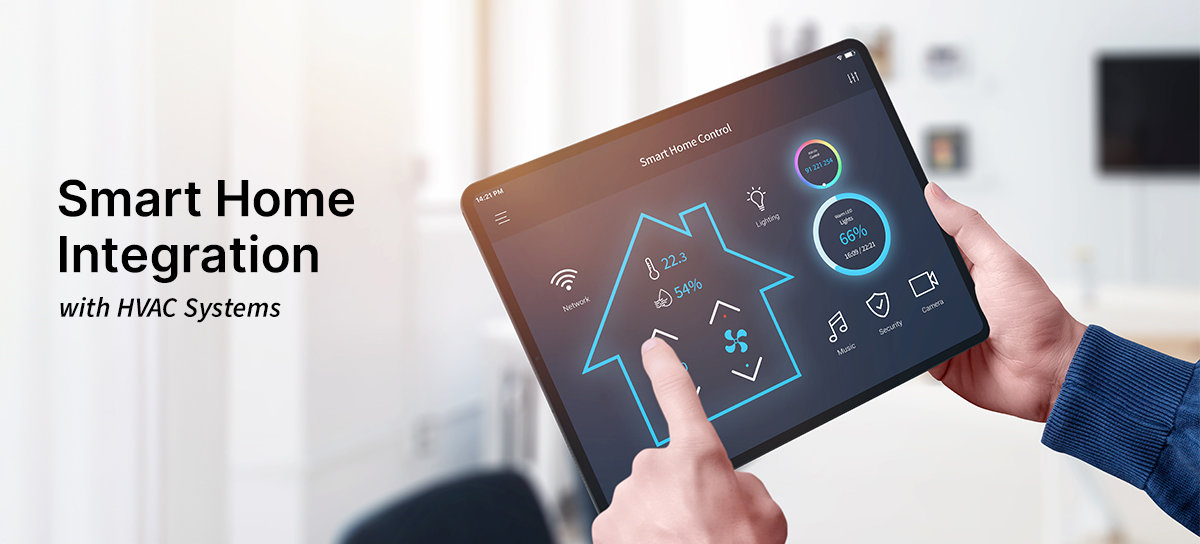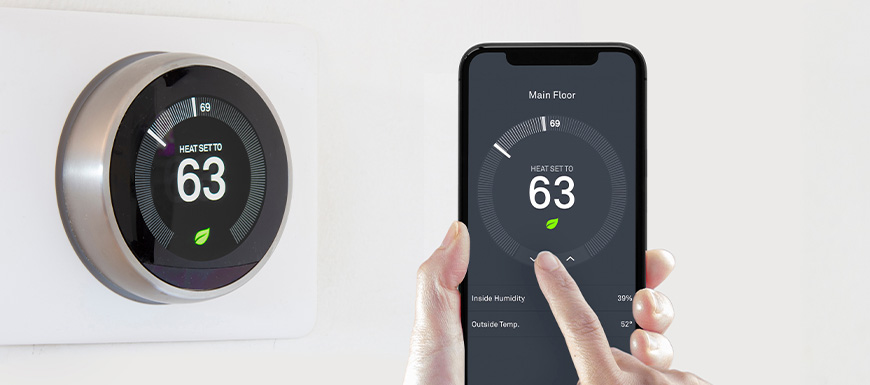
In recent years, the concept of smart homes has surged in popularity, transforming the way we live and interact with our living spaces. Home automation, a cornerstone of this technological revolution, has become more accessible and practical than ever before. From lighting and security to entertainment and convenience, smart homes offer a level of control and efficiency that was once the stuff of science fiction.
At the heart of the modern smart home lies the integration of various technologies to create a streamlined living environment. Among the most crucial aspects of home automation is the integration of Heating, Ventilation, and Air Conditioning (HVAC) systems with smart home technology.
So, why is it so important to integrate your HVAC system with your smart home setup? The answer lies in the remarkable ease it creates. Allowing your HVAC system to communicate with other smart devices and platforms, you gain control over your home's climate, energy consumption, and overall comfort.
Throughout this blog post, we'll look deeper into the world of smart home integration with HVAC systems. We'll explore the fascinating capabilities of smart HVAC technology and the significant advantages it offers homeowners.
We understand how this can seem daunting and overwhelming at best. We are here to support you through this process. Our highly skilled team is one phone call or email away, so don’t be afraid to reach out for any of your HVAC needs.
Smart HVAC systems are integral to home climate control.
Unlike their conventional counterparts, smart HVAC systems are designed to be not just efficient but intelligent. At their core, these systems incorporate a range of components such as smart thermostats, advanced sensors, and sophisticated controllers.
Smart thermostats serve as the brains of the operation, allowing homeowners to remotely monitor and adjust temperature settings, often through smartphone apps or voice commands.
The resulting benefits of this intelligence are many: reduced energy consumption, lower utility bills, and unparalleled convenience, as occupants can enjoy personalized comfort with minimal effort.
Integrating your HVAC system with smart home technology offers a multitude of benefits, from customized comfort and convenience to significant energy savings and environmental responsibility. Here are a few for you to consider:
Smart thermostats offer a wide range of features and capabilities that go beyond basic temperature control. They provide convenience, energy savings, and compatibility with other smart devices, making them a central component of a modern smart home's climate control system.

Here are a few of the most elegant and sought-after features:
Smart thermostats offer precise control over your home's temperature. You can set and adjust the temperature with accuracy, ensuring your home is always at your preferred comfort level.
These thermostats allow you to create customized heating and cooling schedules. You can program them to automatically lower the temperature when you're away or asleep and raise it before you return or wake up, optimizing energy usage.
One of the standout features of smart thermostats is their remote accessibility. Through dedicated smartphone apps, you can control your thermostat from anywhere with an internet connection. This means you can adjust the temperature while at work, on vacation, or even in bed, ensuring your home is comfortable when you arrive.
Smart thermostats are compatible with popular virtual assistants like Amazon Alexa, Google Assistant, and Apple's Siri. This enables voice commands for temperature adjustments. For instance, you can simply say, "Alexa, set the temperature to 72 degrees," and your thermostat will respond accordingly.
Many smart thermostats incorporate machine learning algorithms that adapt to your preferences and daily routines. Over time, they learn when you like the temperature to be adjusted and can make these changes automatically, optimizing energy efficiency without sacrificing comfort.
Some smart thermostats provide detailed energy usage reports. These reports offer insights into your heating and cooling patterns, helping you identify opportunities for further energy savings and efficiency improvements.
Geofencing technology can be used to detect when you're approaching or leaving your home. Your thermostat can then adjust the temperature accordingly, ensuring comfort when you're home and energy savings when you're away.
Smart thermostats often integrate seamlessly with other smart home devices, creating a cohesive smart home ecosystem. For example, they can work with smart blinds, fans, and even your home security system to coordinate climate control with your overall home automation.
Some smart thermostats come with remote temperature sensors that can be placed in different rooms. These sensors help ensure that the thermostat adjusts the temperature based on the conditions in the room you're actually occupying, improving comfort and efficiency.
Smart HVAC integration, particularly through the use of smart thermostats, offers remarkable energy efficiency and cost-saving advantages.
These intelligent systems optimize heating and cooling schedules to align with daily routines, using sensors and algorithms to prevent unnecessary energy consumption. Homeowners can expect substantial savings on their energy bills, with potential reductions of up to 20% annually, depending on factors like climate and home size.
These financial benefits, coupled with extended HVAC equipment lifespan and potential utility incentives, make smart HVAC integration a wise investment for homeowners, providing not only comfort and convenience but also significant financial and environmental rewards.
It's crucial to recognize that while many HVAC problems can be resolved with DIY troubleshooting, certain issues demand the expertise of a professional technician.
Signs indicating it's time to call an HVAC technician include complex problems like:
If you notice unusual or potentially dangerous situations such as sparking wires, gas odours, or persistent carbon monoxide detector alarms, immediate professional intervention is imperative for your safety and well-being.
Ultimately, when it comes to your HVAC system, safety should always take precedence, and for intricate or hazardous issues, entrusting a skilled technician ensures not only your comfort but also your peace of mind.
We understand how this can seem daunting and overwhelming at best. We are here to support you through this process. Our highly skilled team is one phone call or email away, so don’t be afraid to reach out for any of your HVAC needs.
